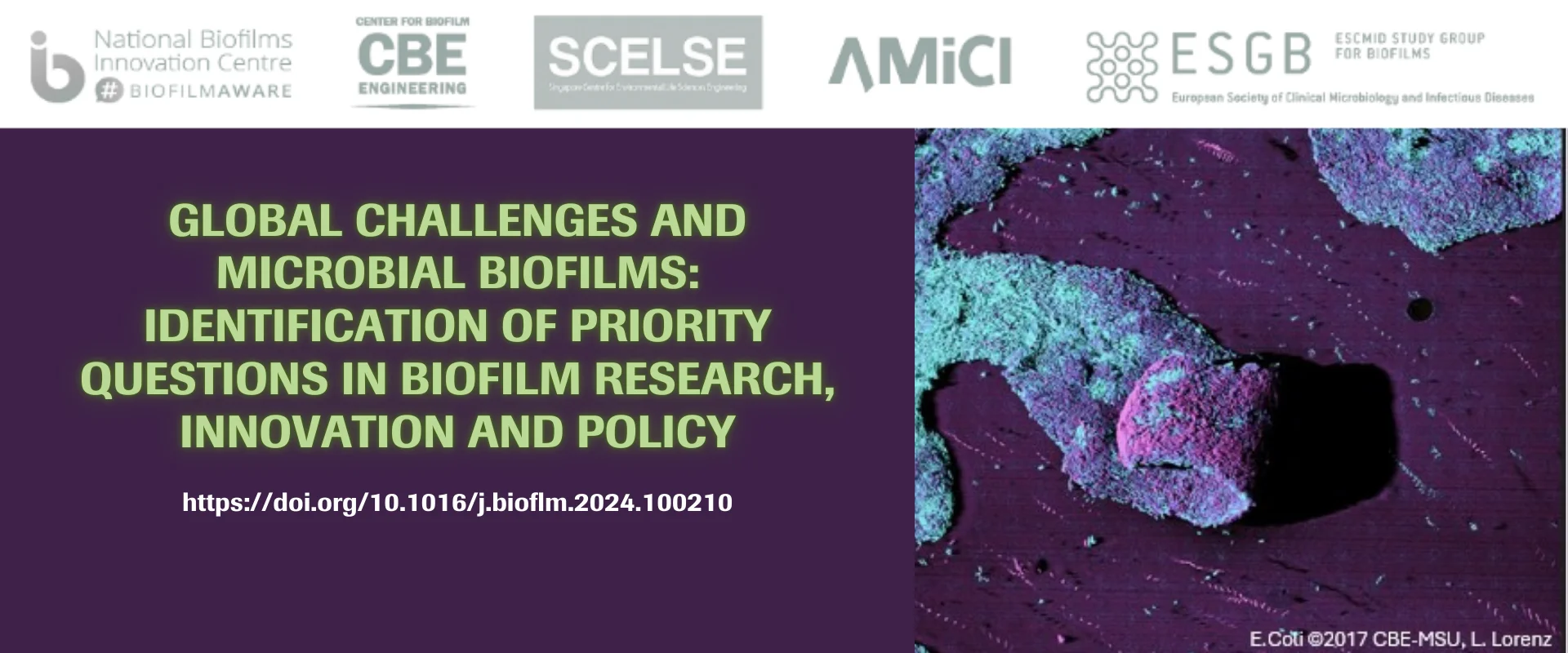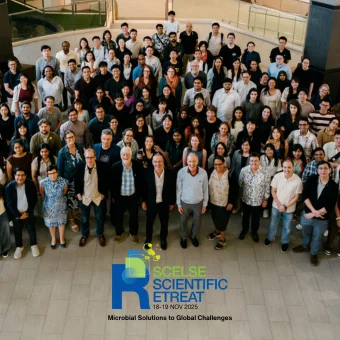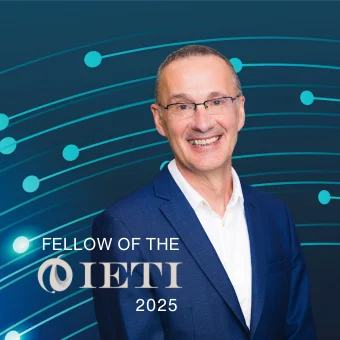Global Challenges and Microbial Biofilms: Setting Future Research, Innovation, and Policy Agendas

credit: E.Coli ©2017 CBE-MSU, L. Lorenz.
- In the Media, Featured
- 18 Jul 2024
PRESS RELEASE
In a significant step towards addressing the global challenges posed by microbial biofilms, a new research paper titled ‘Global Challenges and Microbial Biofilms: Identification of Priority Questions in Biofilm Research, Innovation, and Policy’ has been published. This comprehensive study outlines a roadmap for advancing the field by identifying key research priorities.
Microbial biofilms, which are complex communities of microorganisms that adhere to surfaces, present both significant opportunities and challenges in scientific, societal, and economic contexts. These biofilms are found in a wide range of environments, from industrial settings to medical devices, and play critical roles in both health and disease.
To guide future research, innovation, and policy development, the study utilized a priority question exercise, a method increasingly employed to frame and set agendas. By bridging the gap between the discoveries and data generated by researchers and the information required by policymakers and funders, this exercise aims to steer the field towards impactful advancements.
The study was undertaken by an international group, with members from the National Biofilms Innovation Centre (NBIC), the Center for Biofilm Engineering (CBE), the Singapore Centre for Environmental Life Sciences Engineering (SCELSE), COST AMiCI Consortium, the ESCMID Study Group for Biofilms (ESGB) and partners.
The research team reviewed questions submitted by the international biofilm research community and practitioners across industry, environment, and medicine. To ensure an unbiased selection, computational approaches were used to group questions and manage the voting and selection process. The outcome is a set of 78 unique questions categorised into six key themes:
- Biofilm Control, Disruption, Prevention, Management, Treatment (13 questions)
- Resistance, Persistence, Tolerance, Role of Aggregation, Immune Interaction, Relevance to Infection (10 questions)
- Model Systems, Standards, Regulatory, Policy Education, Interdisciplinary Approaches (15 questions)
- Polymicrobial Interactions, Ecology, Microbiome, Phage (13 questions)
- Clinical Focus, Chronic Infection, Detection, Diagnostics (13 questions)
- Matrix, Lipids, Capsule, Metabolism, Development, Physiology, Ecology, Evolution, Environment, Microbiome, Community Engineering (14 questions)
These questions are designed to highlight opportunities, stimulate discussion, and provide focus for researchers, funders, and policymakers. By informing future research, innovation, and development strategies for biofilms and microbial communities, this study aims to drive forward impactful solutions to the challenges posed by microbial biofilms.
Tom Coenye, former Chair and representative of the ESCMID Study Group for Biofilms Executive Committee said:
“The success and relevance of priority questions exercises, such as the one described here, hinge on input from a diverse set of domain experts. While we achieved a good balance in terms of gender and geographical distribution, we acknowledge the underrepresentation of participants from the Global South and those active in the field of biofilms outside academia. Addressing these gaps will be crucial for future exercises”
“Moreover, the selection and grouping of questions into meaningful themes must be unbiased and manageable. By combining manual data curation by experts with computer-driven groupings, we believe we have accomplished this goal. The 78 questions identified highlight areas with opportunities to go beyond the state-of-the-art, as well as barriers in translation and technology development that need to be overcome to deliver societal benefits”.
Professor Jeremy Webb, Co-Director at the National Biofilms Innovation Centre said:
“We hope that these questions will stimulate interdisciplinary discussions among researchers in academia and industry, as well as policymakers. However, it’s important to recognize that not all topics deserving the label ‘priority’ may have been addressed in the current list. Priorities will inevitably change over time with scientific advances and policy shifts”
“While we believe the priority questions identified in this exercise will remain valid in the near future, this is not a static document. Biofilm research and policy priorities will need to be revisited and updated frequently to stay relevant and impactful”.
The research underscores the importance of interdisciplinary collaboration and the need for standardised approaches in studying and managing biofilms. As microbial biofilms continue to affect various sectors, this prioritised agenda serves as a crucial tool in guiding efforts to harness their potential while mitigating their adverse effects.
Matthew Fields, Director at the Center for Biofilm Engineering said:
“The efforts of this working group will play an important role in bridging the gap between the data generated by researchers, and the information needed for policymakers to make funding or regulatory decisions. This endeavour will likely set much of the agenda for biofilm research for the next decade or more”.
For more information about this study and to access the full paper, please visit the ScienceDirect Elsevier website.
***END***
Notes to Editor:
National Biofilms Innovation Centre (NBIC)
The National Biofilms Innovation Centre (NBIC) is an Innovation Knowledge Centre (IKC) funded by BBSRC and Innovate UK. NBIC was launched in 2017 by its four lead Universities (Edinburgh, Liverpool, Nottingham and Southampton) and is led by four Co-Directors: Professors Cait MacPhee, Rasmita Raval, Miguel Cámara and Jeremy Webb respectively. With a consortium of 63 academic partner institutions across the UK, NBIC is the central hub where academia, industry, government and public policy come together to tackle the grand challenges biofilms present, impacting $4 trillion in global economic activity, from food and health to ships, clean water and energy. NBIC’s mission is to establish a network of research and innovation capacity to catalyse partnerships with industry to achieve breakthrough innovations and impact.
Contact
Natasha Nater, Communications Manager
E: natashan@biofilms.ac.uk
Center for Biofilm Engineering (CBE)
Established in 1990, the Center for Biofilm Engineering is the world’s first, largest, and best-known research center dedicated to biofilm research. At the CBE, multidisciplinary research teams develop beneficial uses for microbial biofilms and find solutions to industrially relevant biofilm problems. It is based in Bozeman, MT, USA.
Contact
Kristen Griffin, Technology Development Specialist
E: kristen.griffin@montana.edu
Singapore Centre for Environmental Life Sciences Engineering (SCELSE)
The Singapore Centre for Environmental Life Sciences Engineering (SCELSE) aims to discover, control and direct the behaviour of microbial biofilm communities and microbiomes for sustainable environmental, engineering, public health and medical applications.
Contact
Pauline Teo, Assistant Director, Science Communications
E: pauline.teo@ntu.edu.sg
ESCMID Study Group for Biofilms (ESGB)
The European Society of Clinical Microbiology and Infectious Diseases (ESCMID) is a non-profit organization whose mission is to improve the diagnosis, treatment and prevention of infection-related diseases. This is achieved by promoting and supporting research, education, training, and good medical practice. The objective of the ESCMID Study Group for Biofilms (ESGB) is to increase knowledge on various aspects of microbial biofilms with as ultimate goals improved diagnostic tools for biofilm infections, and better approaches to prevent and treat such infections. In order to obtain these goals, a multidisciplinary approach is necessary and one of the objectives of the ESGB to facilitate cooperation between scientist working on biofilms in different disciplines.
Contact
Tom Coenye, former Chair and representative of the ESCMID Study Group for Biofilms Executive Committee
E: Tom.Coenye@ugent.be




